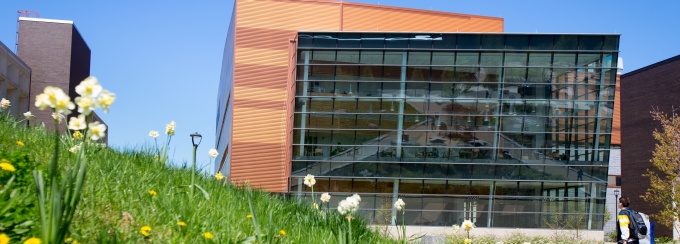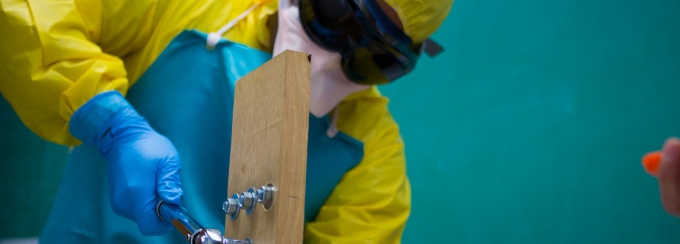Areas of Focus
On this page:
Performance in Extreme Environments
Although much is known about human physiology and exercise science, strikingly little is known about how to train public safety and military personnel to perform better on job specific tasks in hostile environments or while working in protective gear.
Military and commercial divers and special warfare personnel from every branch of the armed services face unique physical challenges when operating in the underwater environment. This CRESE research mainstay will be continued and expanded by examining new areas of undersea medicine.
Performance and Recovery After Underwater Immersion
Immersion or submersion in water and depth have cardiovascular and renal implications. The major factor of concern is the fluid shifts from cells to the vascular compartment and then the translocation of the blood to the chest leading to an increase in right atrial pressure, stroke volume, and cardiac output. These effects, if uncompensated for, result in increased cardiac work and arterial blood pressure. In water there is compensation via the renal system and blood volume is returned to control levels. However, during egress the fluid shift reverses and can cause a drop in stroke volume, cardiac output and blood pressure, leading to orthostasis. This is important to all egresses from water, but of special importance to divers and astronauts. The latter are exposed to microgravity, which has similar physiological effects to water immersion.
Carbon Dioxide Retention
The human body tightly regulates the level of carbon dioxide in the blood, which is important in regulation of pH and cellular homeostasis. Normally, if carbon dioxide production increases, during exercise for example, the ventilation increases to maintain normal arterial CO2 levels. Divers and firefighters they may voluntarily under-ventilate and allow carbon dioxide levels to increase in the blood. Finally, if the work being done by the respiratory system is increased (diving, altitude, pulmonary disease) the muscles used in respiration may fatigue and thus not be able to support a ventilation that matches carbon dioxide production leading to its retention. In divers and persons at altitude, elevated carbon dioxide can exacerbate conditions like the narcotic effects of gases and the ability to eliminate gas leading to the condition known as decompression sickness.
Oxygen toxicity
Although essential for life, too much oxygen can result in pulmonary or central nervous system toxicity. The increased ambient pressure associated with diving increases the partial pressure of oxygen in any breathing mixture. While modern dive tables and limitations on what breathing gases are available have greatly reduced the threat in recreational divers, multi-day dives and extraordinary dives completed by military and commercial divers make oxygen toxicity and ongoing concern.
Faculty working in this area of focus include:
David Hostler, PhD, NRP, DMT-A
Deanna Colburn Hostler, PT, DPT, PhD
Zachary Schlader, PhD
Blair Johnson, PhD
David Pendergast, EdD
Thermoregulation is a mainstay of environmental physiology research. CRESE investigators examine both hyper-and-hypothermia as they are related to mission readiness and performance. Mechanistic studies are examining the interaction of skin temperature, respiration and the perception of exertion, and work of breathing. Populations benefitting from these studies are firefighters, tactical law enforcement, military personnel and commercial divers. Findings from these studies may also benefit other occupational groups and athletes.
Examining Novel Stimulators of the Carotid Body Chemoreceptors
Researchers examine the role of the carotid body chemoreceptors in the compensatory responses to hypoglycemia and heat stress in humans. The carotid body chemoreceptors are small organs located at the bifurcation of the carotid artery. They are traditionally known as the primary oxygen sensors in the body and recent evidence indicates that these chemoreceptors are stimulated by other factors. These factors include changes in blood pH, carbon dioxide, circulating adenosine triphosphate, hyperinsulinemia, potassium, hypoglycemia and heat stress. Activation of the carotid body chemoreceptors increases sympathetic nerve activity, heart rate, blood pressure and ventilation. Carotid body sensitivity could also play a role in oxygen toxicity and CO2 toxicity in divers.
Thermal Protection and Recovery from Thermal Stress
Both CRESE and the Emergency Responder Human Performance Lab have a long history in providing technology and strategies to control thermal stress in the military and firefighters. New technologies are being created by industry to prevent changes in core body temperature by skin heating and cooling. For divers, these devices may have unintended consequences by speeding on-gassing of nitrogen and for firefighters, the added mass of the device may create other performance issues that are not offset by managing core temperature.
Faculty Working in this Area of Focus Include:
David Hostler, PhD, NRP, DMT-A
Zachary Schlader, PhD
Blair Johnson, PhD
Deanna Colburn Hostler, PT, DPT, PhD
David Pendergast, EdD
The public safety community requires that emergency response be available 24-hours a day. Shift work requires the emergency responders to diverge from normal circadian sleep cycles and be alert when the pressure to sleep is greatest. While recent data suggest a link between sleep, fatigue and safety in the EMS setting, the data from the larger public safety sector are limited.
CRESE researchers are currently part of a multi-site clinical trial examining the effects of sleep deprivation and fatigue, and air medical providers and will continue to collaborate in these trials in the future. The investigators in this concentration also have a long history in working with public safety providers in areas of performance and recovery from work in stressful environments.
Performance while working in protective gear: Fire suppression is a physically demanding occupation that places significant physiological strain on the individual. Firefighters often carry heavy equipment and work at high intensity during fire suppression. Other factors such as walking on slippery and/or unstable surfaces and reduced vision from dark, smoke, and/or wearing a facemask may further increase the risk of falling. Previous studies performed in ERHPL have shown that the effect of protective garments and breathing apparatus are complex and there is an uncertain interaction between various forms of fitness (e.g. strength, power, cardiorespiratory) on gait and balance among firefighters. The infrastructure of CRESE and the Departments of Exercise and Nutrition Sciences and Rehabilitation Sciences allow researchers to place physical and environmental stresses on individuals that are similar to conditions of fire suppression and to test physiologic responses, recovery, and the ability to maintain balance and recover from perturbations to gait.
Task analysis and development of training paradigms for female warfighters and public safety personnel: The first two female soldiers successfully completing the United States Army Ranger School have highlighted the need to develop appropriate training regimens for the warfighter. While the accomplishments of First Lt. Shaye Haver and Capt. Kristen Griest are exceptional, researchers do not believe they must be footnotes in military history. David Hostler, PhD, David Pendergast, EdD, Zachary Schlader, PhD and Blair Johnson, PhD, have more than 100 years experience training and conducting research for athletes at the amateur, professional and Olympic level. With their collaborators, they can bring modern exercise physiology techniques and technology to bear to allow other motivated individuals to achieve similar accomplishments.
Women also have difficulty succeeding in the fire service. There are fewer female firefighters in the United States than female Marines. While the military has only rarely updated their training techniques, the fire service has not yet developed physical training regimens that are task specific and based in scientific research. There is considerable debate in the fire service community over the relative merits of size and strength to address the heavy physical burden of fire suppression tasks versus aerobic capacity and fitness. This is compounded by the need to address the high rate of heart attacks suffered in the line of duty. A detailed task analysis will reveal that structural fire suppression is a hybrid activity requiring muscular power and considerable aerobic fitness that must be sustained during upper extremity activity which is far more difficult than maintaining aerobic performance during lower extremity activities such as running. With this information, CRESE researchers can develop and test physical training regimens that will benefit members of the fire service.
Faculty Working in this Area of Focus Include:
David Hostler, PhD, NRP, DMT-A
Jennifer Temple, PhD
Robert Burkard, PhD
Deanna Colburn Hostler, PT, DPT, PhD
John Violanti, PhD
Gregory Homish, PhD
Joseph Bart, DO
Lora Cavuoto, PhD
Additionally, CRESE researchers collaborate with Carolinas Healthcare System and the National Development and Research Institutes on studies in this area.
More than 140 million people worldwide live and work at altitude. Military personnel may be required to travel to altitude with little notice and engage in heavy physical activity. Even traveling in a commercial airplane exposes individuals to mild hypobaric and hypoxic and conditions due to the altitude at which cabins are pressurized.
Acute mountain sickness: Acute mountain sickness (AMS), also known as "altitude bends", is a pathological effect of high altitude on humans, caused by acute exposure to low partial pressure of oxygen at high altitude. Severe forms of AMS include high altitude pulmonary edema (HAPE) and high altitude cerebral edema (HACE). Military personnel working in the mountains of Afghanistan and pilots’ exposure to sudden decompression have suffered both mild and severe forms of altitude sickness. The issues associated with AMS extend beyond the military and are serious issues among recreational hikers and mountaineers. Aside from immediate descent to a lower altitude, treatments are largely based on consensus.
Cardiac responses to altitude exposure: An NEJM article published in 2013 reported that heart attacks during commercial air flights typically have poor outcomes but the underlying reason is not known. Data collected in CRESE during a United States Special Operations Command (SOCOM) funded study found that one third of young, healthy subjects have T wave depression that was not related to ventilation, heart rate, or arterial CO2/O2 potentially indicating that the mild hypoxia associated with air travel has secondary effects on cardiac channels. While these effects may be trivial in younger individuals, older travelers and those with cardiac issues may have an increased risk of heart attack when exposed to mild hypoxia. These studies can only be conducted in a center such as CRESE and the outcomes of these studies will not only affect the safety of air travel but could have broad implications in many chronic and acute hypoxic disease states.
Faculty Working in this Area of Focus Include:
David Hostler, PhD, NRP, DMT-A
David Pendergast, EdD
Prehospital and Battlefield Medicine

This research area involves understanding interactions between the environment and the ability to withstand blood loss, as occurs during a hemorrhagic injury. CRESE researchers have extensive experience using lower body negative pressure as a safe, non-invasive surrogate to study the physiological responses to hemorrhage in humans. Using this model, CRESE reseearchers examine the numerous environmental stressors encountered by trauma patients and/or warfighters on simulated hemorrhage tolerance, as well as identify countermeasures to improve survival outcomes. These pre-clinical studies will be translated into clinical trials in the prehospital setting.
Additional areas of research will be added as the EMS Fellowship and Division of Prehospital Care, both housed in the Department of Emergency Medicine, grow.
Faculty Working in this Area of Focus Include:
David Hostler, PhD, NRP, DMT-A
Deana Colburn Hostler, PT, DPT, PhD
Zachary Schlader, PhD
Blair Johnson, PhD
David Pendergast, EdD
Engineering Interests

CRESE has an extensive history of collaboration with the School of Engineering and Applied Sciences. A notable collaboration was the creation of a diver thermal protection system that included development of novel battery technology. This system is the progenitor of nearly every commercially available system used in military, commercial and recreational diving.
A method for studying the effect of surface coatings on hydrodynamic drag was developed by Mark Ricotta and Robert Baier at the Industry/University Center for Biosurfaces. CRESE collaboration was essential to validate the technique and develop initial surfaces to reduce drag on ship hulls and props. Follow up studies are currently being proposed by Baier to the U.S. Navy and the Keck Foundation to develop more durable coatings that will improve shipping in ice laden arctic waters.
These collaborations will continue and CRESE resources will be available to colleagues to test new technologies for use in extreme environments.
